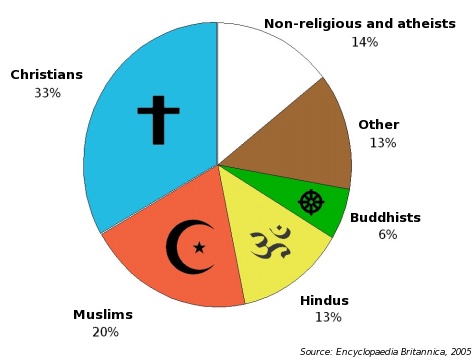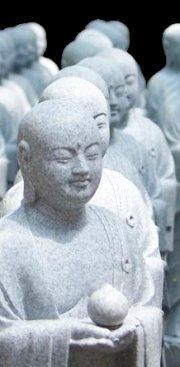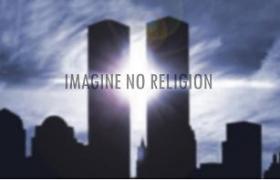I am writing to you, that,
the last time they asked you about your religion, you said that you were Christian. I have something I want to say to you. I have an invitation for you. But I need to explain you first why this invitation.
Catholics, Protestants, Anglicans, Orthodoxes and other minor denominations, constitute together the Christian faith, that groups roughly 1/3 of the population of the world. This chart shows the major religious (or irreligious) groups in the world, and the fraction of the population belonging to each one. Notice that none of them has the absolute majority.
 These groups are not homogeneous
These groups are not homogeneous. Not all Christians believe the same things, for instance Mormons believe that in general sins should be confessed directly to God, while Catholics and Orthodoxes think that all sins should be confessed to a priest. Shiite Muslims think that the direct successor of Mohamed is his son-in-law and cousin Ali. Sunni Muslims, which are the majority, think that the direct successor of Muhammad is caliph Muawiya, who defeated Ali in the battle for the succession. Anyways, even if they differ in the details, these religions agree in fundamental things, which is the reason why they can be grouped as shown in the chart above.
Only one of these groups is right, or at least only one of these groups is right in the fundamental issues. Either Mohamed is the prophet sent by god, or he is not. Both things cannot be true simultaneously. Either Jesus was born of a virgin woman, or he was born from a woman who had sex before with someone, possibly with his husband. Either Buddha was enlightened, or he was not. Again, we are speaking about issues that are central to each religion, not accessory.

Hence, main religions are
mutually incompatible. Even when they all sound quite emphatic, at most one of them got things right. Of course they all admit some limited exceptions, for instance the Catholic Church teaches that exceptionally someone outside the church can be saved, as a person can travel a street without knowing its name. But salvation outside the Church is reserved for very rare occasions. If Christians are right, and if judgment day is tomorrow, 2 billion people on Earth will be saved, and the vast majority of the other 4 billions will go to hell.
The main problem of this division between salvation and hell is that
the religion of a person is almost completely determined by its place of birth. In America (the continent, not the country), people are mainly Catholic or Protestant depending on whether they where born on an English, Dutch, Portuguese, or Spanish ex-colony. In Russia and Eastern Europe, believers are mostly Orthodox, and in the Middle Eastern and in the north of Africa, religious people are mostly Muslim. If you are Christian, it is most probably that it is because you were born in a country with a Christian majority, and not because you have had a personal revelation about the truth of god.
Moderate Christians
Perhaps you consider yourself a
moderate Christian. This has many different meanings, but it usually boils down to two things. First, you do not go every Sunday to mass, neither you observe "religiously" all the obligations of a Christian. Second, you do not believe in all the teachings of your church. Most catholics and many Christians are like that, and there is nothing wrong with it. With respect to the first, there are things much more interesting to do on a Sunday morning. With respect to the second, the teachings of most churches are too many and to diverse to believe in all of them.

A typical example in the Catholic teachings is the assumption of Mary, after her death by natural causes. The flesh and bones of the mother of Jesus, according to the Catholic Church, did not rot as the flesh and bones of his husband Joseph and the rest of the mortals. As Jesus (and only they two, not John, not Peter, none of the others),
Mary ascended to heaven when she died. This is not in the bible. It was established by the tradition as years went by, and was declared an ineffable dogma in 1950 by Pious XII. It is part of the "mysteries of faith" (read: "things that not even we believe") more difficult to swallow.
I guess you do not blindly believe the full book of Catholic or Christian teachings. As the rest of believers,
you choose in what to believe. There are passages in the Bible that are meant to be taken in a figurative (or metaphorical) sense, and others that should be taken literally. For instance, "Married women, submit to your own husbands as if to the Lord" (Ephesians 5:22) is meant to be read in a figurative sense (¿which?), while others as "thou shall not kill", or "honor thy father and thy mother", are meant to be taken literally. Other passages of the bible, such as "go and sell your possessions and give to the poor" (Matthew 19:21) have an interpretation that can be figurative or literal depending on how many possessions you have.

Besides, there may be things in which you believe that are not Christian.
Rebirth is a very attractive idea that has adepts in all religions. Rebirth or Reincarnation traditionally is the belief that after death we can born again in an animal or another human being, depending on our actions. The western adaptation of rebirth, heavily influenced by the Christian teaching that non-human animals lack a soul, only admits rebirth as a human. Anyways it is an idea that brings consolation and has many adepts.
The problem of declaring yourself as Catholic, Christian, Muslim, etc. without really being so, or baptizing kids into a religion without letting them decide about it, is that
it gives power to very dangerous people. I am speaking of people that use these statistics to speak in your name to presidents, senators, military men, lawyers, economists, etc. People that take that statement you do of "being Christian" and turns it into "obeying the church".
Dangerous people
When you say you are, for instance, Catholic, you give base, power and ammunition to people that are very different from you, that believe in thousands of things in which you do not believe, that possibly has never experienced the love of a man or a woman in freedom and without guilt. When you say you are Catholic, you are giving more power to people that are really crazy, that should be in an asylum, looking at the birds and remembering better times in the Nazi Youth.

History has repeated itself over and over. A few hundred years ago the Catholic Church had more power than now. When they had more power, they used it to burn those who were different. They authorized and practiced torture. They locked Galileo when he was almost 70 years old, and they kept him under house arrest until his death 9 years later for telling that the Earth revolved around the Sun. But that was 400 years ago, and it can be argued that church now is much more modern. In part, at least the Catholic church has changed. After a disastrous and long history of always aligning with the looser in scientific ideas, now the Vatican does not condemn Darwin's evolution. A big leap forward.

The Catholic Church during its whole history has condoned massive killings. It has never reconciled with its intellectual father which is Judaism (half of the Catholic bible, the Old Testament, is from the Jewish Bible), and they spoke very late against the Nazis, looking aside while Jews where killed. They also found a big enemy in communist Marxism, and applied the thesis that "the enemy of my enemy is my friend", aligning themselves with the enemies of Marxism despite their methods. The Catholic church has always sided with the powerful, and very few times with the poor.
Personal Christianity
An option for a person who is born in a Christian country, but that do not believe all what the churches say, is to have a form of personal Christianity, or declaring him/herself
"sympathizer" of a religion. One can "sympathize" with the Democrats without being a member of the Democratic Party. In fact, in principle you can "sympathize" with several political parties at the same time, taking the best from each one of them and synthesizing your own idea of what is the best way of distributing power and governing a country, in this case.
However, this analogy is not valid. The situation is more similar to basketball, in which you cannot "sympathize" (I guess) with the LA Lakers and the Sacramento Kings simultaneously, specially if you live in California, because there is a strong, deep, rivalry. At the same time, you can not "sympathize" with both Catholicism and Buddhism and live on planet Earth. Perhaps you could if you lived in Mars.

Another option is to invent a completely new religion for oneself, and in the case of Christianity, relate to Jesus in a direct way. Unfortunately this is not possible either. Jesus did not write anything. He did not draw a picture, he did not do an engraving. Possibly he spoke Aramaic, but the Bible was written in Greek, several years after the death of Jesus, and using only a few Aramaic expressions here and there. The pictures of Jesus vary with cultures, for Nazis he was probably Aryan, for Europeans, Caucasian, and in some parts of Africa, perhaps
black ¿why not?
But if you have your own Christianity, ¿what do you do with central dogmas?. For instance, Jesus was the
lamb of God. Jews sacrificed lambs to god. Jesus was the lamb that god sacrificed to himself. He did so, because otherwise mankind was lost. All humans sin, and adding the original sin, they have a huge moral debt, so large that a normal person will almost certainly go to hell. But the sacrifice of Jesus was so big that we can receive part of his moral credit (if we accept it) and enter heaven. This moral accounting is central to Christianity, it is the reason why Jesus came to the Earth, to improve the moral accounts of mankind. It is impossible to have a "home made" Christianity without including this and other main aspects of standard Christianity.
Invitation
Having said all this, the invitation is to
consider the possibility of this being a natural world. A natural world is a world where there are no supernatural things. Above us we have the sky, a place of air and birds, not angels. Below the ground there are rocks, not demons. The living are alive, and the deceased, death. This is a
naturalistic view of the universe, in which all there is are natural phenomena.
It is important now to say a couple of things that are
not part of a naturalistic view. First, the fact that the universe is natural does not mean that everything that exists can be seen and touched. There are things that cannot be seen, such as friendship or love, and that certainly exist. Second, the fact that the universe is natural does not mean that all can be understood or explained. There are things that cannot be understood,
there are things that cannot be proven.
All the gods: Zeus, Allah, Thor, Yahweh, etc. come from the same place: from the mind of the men and women who created them. Mankind have existed for a few hundred thousand years, but has organized religions only in the last few thousand years. Religion is also a natural phenomenon, the product of a phase in the evolution of men. Churches have a lot of importance in developing countries, but in developed countries (except in the US) they
loose importance. This is also a natural phenomenon.
 Imagine a world without religion
Imagine a world without religion. Without religion, good people do good things, and bad people do bad things; religion is needed for good people to do bad things. Once someone makes you believe something absurd, he can make you do something terrible. In the last 20 years suicide attacks against civilians have increased. Behind them there is religious Islamic fundamentalism, to which we can not respond with religious Christian fundamentalism.
A vision of the universe as something natural opens many doors and closes no one except superstition. People no longer believe in most of the gods they used to believe in ancient times. The invitation is to go one god further.
Sources: Encyclopedia Britannica, Pew research, Boston Globe, Vatican, Marcus Brigstocke, JSCyL, Wikipedia: Fanon, Cogulus, ChaTo.cl, The Root of all Evil.